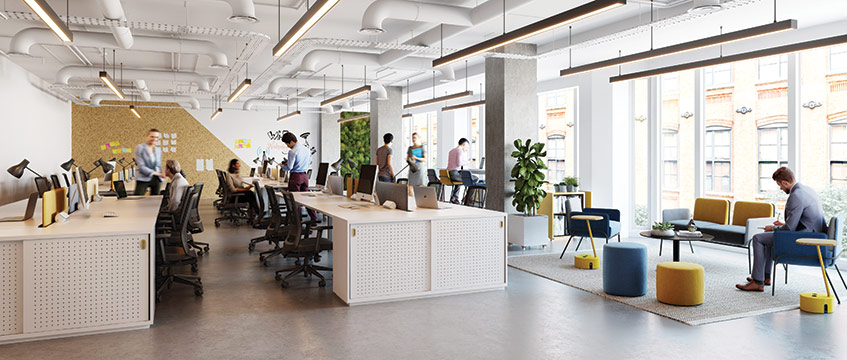Landsec has ventured into the flexible office market for a second time, more than a decade after its first attempt failed.
Myo (from “make your own”) offers customised offices for businesses needing space for between 15 and 80 people on leases ranging from 12 months to three years. It will also offer formalised subletting, so that businesses can rent bigger space to grow into.
The operation is headed by Oliver Knight, who has been at Landsec since 2014, first as its leasing and sales director and then as its investment director.
Landsec’s first flexible office business, Landflex, was launched in the early 2000s before the arrival of Apple’s first consumer iPhone. Knight says: “From a technology standpoint, we have to understand how much the world has changed in that time.”
He adds that the concept of flexible office space back then was more “plug and play space”, which was typically fitted out in a generic form. In comparison, he argues, today people work differently, and business leaders are under more pressure to offer better-quality workplaces to attract and retain the best people.
Knight says: “Myo is more all-encompassing than Landflex. We are thinking about how we give people the best possible day at work. How do we remove the hassle both from [the business] taking new office space and from the day-to-day user in that space.”
This all-encompassing service includes just a three-page agreement document and offers super-fast connectivity as well as IT support and a concierge service.
But don’t expect the beer on tap that was at one time offered in WeWork’s office spaces – or the reported mandatory 4pm Friday happy hours at WeWork’s headquarters.
Knight comments: “We will be covering the obvious things such as refreshments and making sure we have different days with different experiences, without it being over the top.
“I think it’s fair to say the British don’t do enforced fun and there is a time and place where you have got to get on with work as well. So I think there is a fine balance between curating a space and overdoing it.”
All talk?
He adds: “The co-working sector generally has a bit of a reputation for densification and a lot of talk about hospitality but not necessarily delivering day to day – and we are looking at that in detail to make sure we are going to deliver.
“It’s the little touches such as towel service that will make a big difference.”
Myo will open its first venue at 123 Victoria Street, SW1, across 36,000 sq ft in April and Knight says it is already “in negotiations with a few parties on terms”.
Within the space, Myo will also offer six meeting rooms – of which two can become an event space, thanks to movable walls. This will be offered out to Myo members and external customers.
Landsec will look at incorporating Myo within its future developments. It could also occupy any space that becomes vacant in its developed portfolio.
Knights adds that Landsec is also well positioned in terms of balance sheet and financial fire power should it wish to buy assets specifically for Myo.
Currently Landsec has a total office portfolio spanning around 6.5m sq ft and has a development pipeline of around 2m sq ft across London, including its recently acquired site at 25 Lavington Street on the South Bank, and it is looking to bolster this further.
The firm is understood to be in the running for another five-acre site south of the River Thames, near Waterloo.
However, for now, Landsec needs to get it right at 123 Victoria Street to compete with long-time and dominant operators such as WeWork, as well as fellow property firm British Land, which set up a similar business in 2017.
To send feedback, e-mail louise.dransfield@egi.co.uk or tweet @DransfieldL or @estatesgazette











